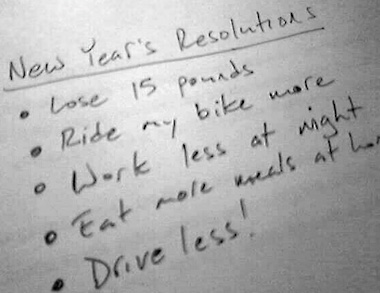 The New Year's Resolution...ah what a wonderful time that is.
The New Year's Resolution...ah what a wonderful time that is. I often ask during this time of year whether people engage in this activity or not. The responses I get are usually fairly interesting. Some answer yes, most no. But rather to my surprise most of them are somewhat tongue in cheek with regards to the resolutions that people profess to engage in (or have engaged in). It's almost as if people know they are doomed to failure or just have to laugh about previous attempts to conquer unrealistic expectations. Whatever the case, I had usually resigned myself to agree that the New Year's Resolution was of little to no value and therefore did NOT engage in such a practice. That was, until my college years.
I once had a conversation with a good friend of mine regarding the topic. In it he explained how he and his family sat down at their dining room table at the start of each year. It was at this table that each member of the family explained in detail to the others what his or her goals and desires were for the upcoming year. True goals...true desires. Suddenly the idea of becoming "resolved" about something at the beginning of the year took on new meaning. It didn't need to be simply trying to put an end to an unwanted habit or making a drastic life change in 2 weeks. It could be about working toward something real...something I was passionate about and desired to make a lasting change in.
So is it worth it? Making that decision? I believe it can be if the perspective is good, the motivation is right, and some helpful tools are utilized. Here are a few (though not an exhaustive list) tools to get started in the right direction.
The most important place to start, I have found, is finding something that is of importance to you. It must be something that has lasting value. If it does not, it will again become just another quickly discarded resolution. Once you've found depth in your direction, there are 3 other general tools to use:
1. Set a goal that is specific and measurable: if you don't you may never know if you've truly accomplished it.
2. Set both short and long term goals: starting with the end in mind and working your way backwards in order to "baby step" your way to the goal is helpful.
3. Set goals that are realistic yet lofty: if it doesn't stretch you, it's not a goal. But something too far fetched may be more of a discourager than an encourager. This may be an area where you seek advice in order to find out what a reasonable goal is (for example, knowing how much one can increase his/her vertical jump in a month or decrease bodyfat is wise to get input on).
4. Write it down: I've heard it said that it's only a wish until you get it on paper. And I might add that once you've got it written down, share it with those that are close to you so they can keep you accountable and encourage you along the way. Research shows that adherence to fitness goals can increase 200-300% when you are held accountable on a regular basis.

No comments:
Post a Comment